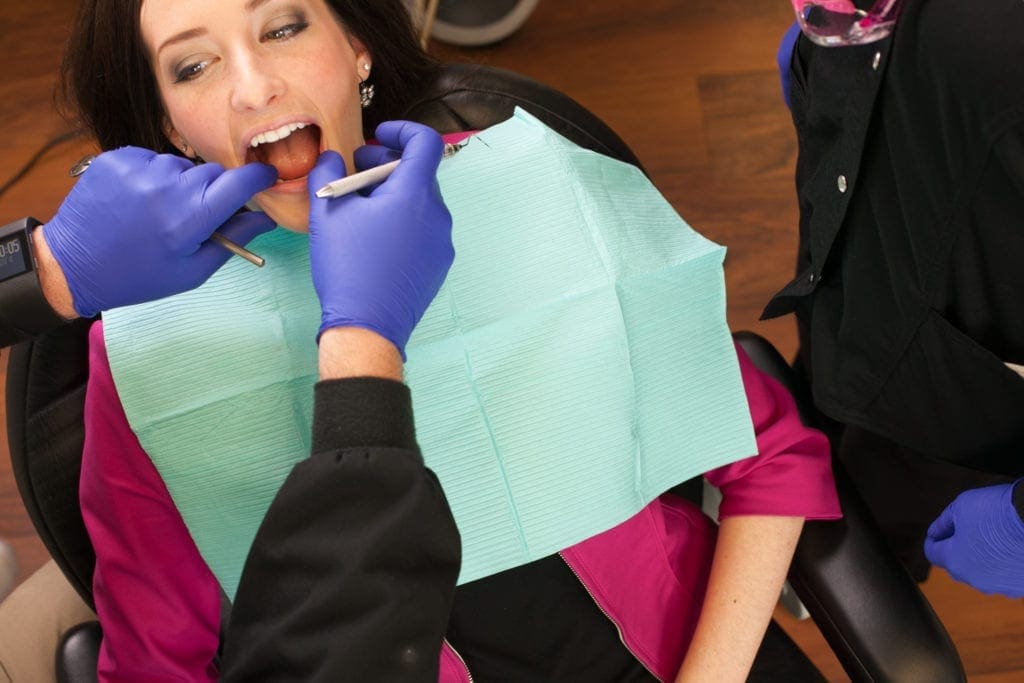Preventative dental care is the foundation for long-term oral health. Your routine visits to Fuller Dental help us monitor your oral health and catch small problems early. This preventive care is a key dental service we provide to help you avoid common dental issues.
Early detection gives you the best chance for a successful, long-term result with the simplest treatment possible.
We build our practice on lasting relationships. We care for our patients like we care for our own family. That starts with educating our patients on the importance of general dental care.
What to Expect
Your visit to our Burlington, NC office includes one-on-one time with a dentist to discuss your goals and concerns. We’ll perform a comprehensive exam to check for any underlying issues and then clearly explain all your treatment options.
During your routine visit, you can expect:
- A thorough dental exam
- X-rays and diagnostics as needed
- A dental cleaning
- Fluoride treatment, if necessary
- Screenings for cavities, gum disease, oral cancer, and other early oral signs of health concerns

Preventative dental care treatments we provide:
We’ll also give you personalized hygiene tips to keep your smile healthy and bright between visits.
Most routine preventative visits take approximately one hour. We recommend that patients of all ages come in twice a year for routine dental care. Maintaining a healthy smile is important to your overall physical health and well-being. Your oral health can impact your physical health in many ways and your confidence in your appearance.
We become your partner in health by getting to know you personally and understanding your unique health profile. From gum disease and tooth decay to sleep apnea, we offer personalized care to meet your needs.
Fuller Dental dedicates itself to your oral health. We provide comprehensive care so you can enjoy the confidence of a healthy smile.
Dental Care Services For Children
Starting regular visits to the dentist early will help teach your child healthy lifetime habits. Parents are encouraged to bring their children to the dentist early so they can become familiar with our dental office.
Our staff makes every effort to ensure our young patients’ comfort and safety, helping them develop confidence in their oral hygiene habits and feel comfortable when they visit with us for routine care.
One of the biggest challenges in children’s dentistry is preventing tooth decay. With routine visits to our dentist office, we can prevent tooth decay and subsequent dental cavities. Parents can do many things to ensure the health of their children’s teeth between visits:
- Brushing teeth twice a day
- Flossing once a day
- Limiting sugary drinks
- Following recommended guidelines for nursing, bottle, and sippy cup use
Frequently Asked Questions
We have answers to some of the most commonly asked questions concerning preventative dental care services.
What are sealants, and should my child get them?
Dental sealants are thin, protective coatings applied to the chewing surfaces of back teeth. They help block out food and bacteria that cause cavities. For the best protection, apply sealants as soon as your child’s permanent molars appear (around ages 6 and 12). This quick, painless treatment adds a strong defense against cavities.
Do adults ever need fluoride treatments, too?
Absolutely. Fluoride treatments are highly effective for adults with a high risk of cavities or sensitive, exposed roots.
Fluoride helps strengthen enamel and protect against decay. It can also reduce sensitivity for some patients. Dr. Rawley Fuller can let you know if it’s a good option based on your oral health.
Can dentists spot wisdom teeth issues during routine exams?
Yes, we often catch problems with wisdom teeth during routine exams and dental X-rays. You may not feel pain, but we can still detect early signs like crowding, decay, or poor eruption patterns. Catching these issues early helps prevent infections, damage to other teeth, and alignment issues.
Can cavities form even if I brush and floss regularly?
Yes, brushing and flossing are important, but cavities can still form, especially in hard-to-reach areas or deep grooves in the teeth. Diet, genetics, and lack of fluoride exposure can also play a role. Regular dental cleanings and exams help catch cavities early before they worsen.
How can you tell if you’re grinding your teeth at night?
Signs of night grinding include morning jaw pain, headaches, worn-down teeth, or increased tooth sensitivity. Dr. Fuller may also notice flat or chipped teeth during a routine exam. In some cases, you might hear clicking in the jaw or feel stiffness when waking up.
How often should I replace my toothbrush or toothbrush head?
You should replace your toothbrush or electric brush head every 3 to 4 months. If the bristles fray sooner, it’s time for a new one. Using a worn brush can reduce cleaning effectiveness and be rough on your gums.
Is fluoride treatment necessary for adults or just children?
Fluoride isn’t just for kids. It can benefit adults, too, especially those with cavities, gum recession, or dry mouth. It strengthens enamel and helps prevent decay. Dr. Fuller may recommend in-office fluoride if you’re at higher risk or as part of your preventive care plan.
Schedule A Dental Exam Visit Today
Fuller Dental welcomes new patients! We’ve been a trusted dental practice for over 45 years, serving Burlington, Elon, Graham, Mebane, and nearby communities. To schedule a visit, contact us directly or request an appointment online. We look forward to meeting you!
